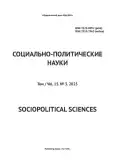Государственное регулирование внедрения искусственного интеллекта в систему образования: вызовы и перспективы
- Авторы: Бочанов М.А.1
-
Учреждения:
- Финансовый университет при Правительстве Российской Федерации
- Выпуск: Том 15, № 3 (2025)
- Страницы: 86-92
- Раздел: Государственное управление и отраслевые политики
- URL: https://journals.eco-vector.com/2223-0092/article/view/687862
- DOI: https://doi.org/10.33693/2223-0092-2025-15-3-86-92
- EDN: https://elibrary.ru/SLJWZG
- ID: 687862
Цитировать
Полный текст
Аннотация
Актуальность исследования обусловлена стремительным внедрением технологий искусственного интеллекта (ИИ) в образовательные системы при отсутствии сбалансированных регуляторных механизмов. Цель данного исследования – проанализировать ключевые научные позиции и практические инициативы, связанные с формированием государственных регуляторных рамок для ИИ в образовании, выделить основные вызовы и обозначить перспективные направления развития. Технологический прогресс опережает формирование правовых рамок, создавая риски нарушения академической добросовестности, конфиденциальности данных и усиления цифрового неравенства, что требует комплексного анализа государственных стратегий управления этими процессами в России и за рубежом. В ходе исследования установлено, что ключевой проблемой является нормативная асинхронность: законодательные инициативы не успевают за динамикой развития ИИ, особенно в сфере генеративных технологий.
Полный текст
Об авторах
Максим Александрович Бочанов
Финансовый университет при Правительстве Российской Федерации
Автор, ответственный за переписку.
Email: max8797@list.ru
ORCID iD: 0000-0002-0802-1418
SPIN-код: 4326-4510
кандидат политических наук; доцент кафедры политологии
Россия, МоскваСписок литературы
- Абдусаламов Р.А. Основные направления правового регулирования использования искусственного интеллекта в сфере высшего образования // Юридический вестник Дагестанского государственного университета. 2024. № 4.
- Ефимова Л.Л. Правовое регулирование информационной безопасности детей как новый правовой институт информационного права // Аграрное и земельное право. 2018. № 6 (162). С. 131–138.
- Земцов С.П., Демидова К.В., Кичаев Д.Ю. Распространение Интернета и межрегиональное цифровое неравенство в России: тенденции, факторы и влияние пандемии // Балтийский регион. 2022. Т. 14. № 4. С. 57–78.
- Лукичёв П.М. Государственное регулирование применения искусственного интеллекта // Вопросы инновационной экономики. 2025. Т. 15. № 2. doi: 10.18334/vinec.15.2.122725
- Сайфулина Я.А., Гончарова С.Г. Соблюдение прав ребенка в эпоху искусственного интеллекта // Современные вызовы и пути решения проблем в сфере защиты прав детей: реализация принципов конвенции о правах ребенка: сб. матер. II Всерос. науч.-практ. конф. (Екатеринбург, 17 ноября 2022 г.). Екатеринбург: Российский государственный профессионально-педагогический университет, 2022. С. 302-306.
- Скопина И.В. Использование ИИ в управлении образовательными организациями // Современные технологии управления. 2024. № 3 (107).
- Чехович Ю. Проблемы академической добросовестности в эпоху ИИ // Материалы конф. «КорФор-2024». 2024. URL: https://www.unkniga.ru/ai/ii-v-nauke-obrazovanii-i-bibliotekakh.html
Дополнительные файлы











